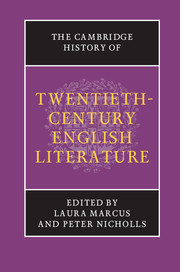Book contents
- Frontmatter
- Introduction
- PART ONE WRITING MODERNITY
- PART TWO THE EMERGING AVANT-GARDE
- PART THREE MODERNISM AND ITS AFTERMATH, 1918–1945
- PART FOUR POST-WAR CULTURES, 1945–1970
- 25 Culture, class and education
- 26 Post-war broadcast drama
- 27 Drama and the new theatre companies
- 28 Modernism and anti-Modernism in British poetry
- 29 Nation, region, place: devolving cultures
- 30 The sixties: realism and experiment
- 31 ‘Voyaging in’: colonialism and migration
- PART FIVE TOWARDS THE MILLENNIUM, 1970–2000
- Bibliography
- Index
- References
29 - Nation, region, place: devolving cultures
from PART FOUR - POST-WAR CULTURES, 1945–1970
Published online by Cambridge University Press: 28 March 2008
- Frontmatter
- Introduction
- PART ONE WRITING MODERNITY
- PART TWO THE EMERGING AVANT-GARDE
- PART THREE MODERNISM AND ITS AFTERMATH, 1918–1945
- PART FOUR POST-WAR CULTURES, 1945–1970
- 25 Culture, class and education
- 26 Post-war broadcast drama
- 27 Drama and the new theatre companies
- 28 Modernism and anti-Modernism in British poetry
- 29 Nation, region, place: devolving cultures
- 30 The sixties: realism and experiment
- 31 ‘Voyaging in’: colonialism and migration
- PART FIVE TOWARDS THE MILLENNIUM, 1970–2000
- Bibliography
- Index
- References
Summary
The years between 1945 and 1970 saw a significant increase in public funding for the arts. The Arts Council, the British Council, the British Film Institute and local authorities all invested increasingly in forms of creative production. This process of investment generated a series of complex questions about the relations between cultures and identities, with artists being asked to address an increasingly recalcitrant set of relationships between nation, region and metropolis. In order to capture the particular role of literature in this fraught engagement with questions of region, nation and identity, this chapter will begin with a discussion of the larger economic, political and cultural forces that made devolution such a pressing issue between 1945 and 1970. It will then consider the ways in which the cultural meanings of regionalism were theorised by key cultural figures of that period. Following an analysis of the role of cultural institutions in the creation and development of regional cultures, it will conclude with an analysis of specific aspects of literary production in Scotland, in Northern Ireland, in Wales and in English regions. In each case the aim will be to reach an understanding of the ways in which the literary imagination can respond to the linguistic and formal challenges of a reconfigured geographical and cultural identity.
This reconfiguration was characterised by Tom Nairn, in his reflection on the reinvigorated nationalisms operating within Britain since the war, as ‘The Break-Up of Britain’. Nairn argued that the movement towards devolution in this period was intimately connected to ‘the long-term, irreversible degeneration of the Anglo-British state’.
- Type
- Chapter
- Information
- The Cambridge History of Twentieth-Century English Literature , pp. 528 - 544Publisher: Cambridge University PressPrint publication year: 2005
References
- 1
- Cited by

